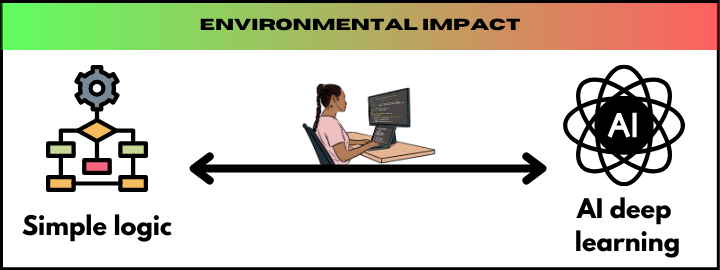Is it responsible to use AI where simple logic would suffice?
It is too easy to reach for AI when developing modern solutions, but what is the eco-impact of that decision?

When all you have is a hammer [because you left the rest of your toolkit at home], everything looks like a nail.
Power users in companies are rushing to automate and streamline business processes, pervasively turning to platforms that offer AI integrations and chatbots such as Make.com, Zapier, power automate, and n8n. At the same time, traditional software developers are turning to these same models, only they are utilising APIs. All of them are doing so without regard to the environmental burden behind these solutions. Developers, used to carefully design logical workflows, now immediately now reach for AI-powered solutions. This new tier of "citizen developers", using no-code AI is making things worse, generating so many workflows on these platforms that include AI.
Simple logic over AI
A classic example: automatically categorising customer support emails. Traditionally, this would involve a rules-based system matching keywords with predefined categories. Now we see developers using large language models to "intelligently" sort these communications, incurring a heavy environmental cost for similar results.
Take another solution: say we are using a vector database and embeddings to categorise products. A database lookup might consume minimal energy, while a similar AI inference solution can generate a carbon footprint much greater. For a task with clear and defined categories, this represents wasteful overengineering.

Who can blame the developers? They are under pressure to produce a minimal viable product quickly and are not being held accountable for the environmental impact of the software. Who can blame the power users of no-code platforms? These platforms have enabled people with no logical thinking skills to solve business problems by offloading them to AI. With real-world commercial pressures at play and no eco-counterpressure, this is not an unexpected outcome.
A valid concern right now is that we are seeing AI being used to solve what feels like every software or business problem. Large language models and AI inference consume significantly more computational resources compared to traditional vector databases or rule-based approaches. Each AI inference can have a carbon footprint several orders of magnitude larger than a direct database lookup or rule-based match. Beyond mere energy use, the additional environmental impact includes the extra hardware required to serve AI results, involving more rare metals and ultimately contributing to electronic waste at the end of its life.
Eco Signposting
 For decades, we have had clear consumer signposting of the environmental impact when buying domestic white goods appliances such as washing machines and dishwashers, with clear, large stickers in showrooms displaying "A" ratings and, in later years, "AAA" ratings after manufacturers smashed through efficiency targets. The software industry is at a turning point, similar to other sectors that have faced environmental scrutiny. Just as physical product distributors now must declare packaging weights and comply with environmental regulations (at a cost to them), software developers are beginning to recognise their ecological responsibilities. Perhaps we might soon see energy efficiency ratings for software solutions, much like the familiar energy labels on domestic appliances?
For decades, we have had clear consumer signposting of the environmental impact when buying domestic white goods appliances such as washing machines and dishwashers, with clear, large stickers in showrooms displaying "A" ratings and, in later years, "AAA" ratings after manufacturers smashed through efficiency targets. The software industry is at a turning point, similar to other sectors that have faced environmental scrutiny. Just as physical product distributors now must declare packaging weights and comply with environmental regulations (at a cost to them), software developers are beginning to recognise their ecological responsibilities. Perhaps we might soon see energy efficiency ratings for software solutions, much like the familiar energy labels on domestic appliances?
The thing is, without giving users information on the environmental impact of features, how can consumers make informed choices?

Signposting not enough
The realist part of me knows consumers and businesses simply won’t be bothered about their eco footprint until it hits them directly in the pocket – say, with an "AI feature tax." Here’s the thing: until there is a direct correlation between consumer costs and eco impact, it is going to be difficult to shape consumer and business behaviour towards more efficient consumption or to encourage developers to think about efficiency when designing software or workflows. As consumers, we are already being forced in other parts of our lives to face uncomfortable choices in the name of the environment. Assessing the most efficient way to solve a problem seems reasonable. Too many expensive workflows will be created, running for years and consuming resources, where a simple logic-based solution would have sufficed. The number of these workflows running quickly becomes a concern.
Everyone is under commercial pressure to get tasks done quickly, and AI gives us this universal "fix-it" tool. AI solutions allow developers and citizen developers to quickly solve problems without having to think deeply or understand the problem. Just reaching for the same tool may seem lazy, but it meets their personal needs and the objectives of the company. AI helpfully de-skills the process of designing software systems and getting to software solutions quickly. The issue, though, is that many times these tasks could be solved with, say, vector databases or simple logic system design rather than AI. Simple logic is far, far cheaper to run than AI inference. We are not just talking about energy; for large workloads, more machines with rare metals are required, and these hardware needs bring other forms of environmental impacts.
Appropriate use of AI
It is positive that some members of the AI industry are increasingly being held to account over AI's environmental impact. It is also fortunate that running efficient AI makes sense; being able to lower operating costs for an AI solution compared to a competitor is enough motivation to fund R&D into AI efficiencies.
AI is not inherently problematic. There are genuine scenarios where artificial intelligence adds real value. The key is using AI as a precise tool, not a universal hammer.
There are things AI does better, and there are features users genuinely need. We just need to be careful that AI does not get overused and that more consideration is given to its application in the future. Unfortunately, commercial pressures to do more with less in economically challenging times are likely to continue sidelining environmental concerns.

Smart Designs:
- Start with the simplest solution possible (vector DB, rule-based)
- Only introduce AI when complexity genuinely demands it
- Consider partial AI augmentation
Back to coding
The environmental impact of AI is surely undoing decades of progress that nations and companies across all sectors have made in improving energy efficiency. As AI becomes a battleground for countries seeking competitive and political advantages over one another, the desire to address AI's energy issues is being put on the back burner. While I wait for the world to solve these problems, I am going back to writing my next AI energy-burning solution – as this AI stuff is addictive. 😉
